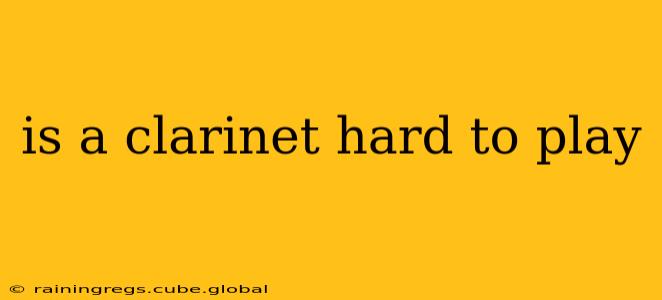Is a Clarinet Hard to Play? A Comprehensive Guide
The question of whether a clarinet is hard to play is a common one, and the answer, like most things in life, is nuanced. It's not a simple yes or no. The difficulty of playing the clarinet depends on several factors, including your musical background, your natural aptitude, your dedication to practice, and your goals.
Let's break down the challenges and rewards of learning this beautiful instrument.
What Makes the Clarinet Difficult for Beginners?
Many beginners find several aspects of the clarinet challenging initially:
-
Embouchure: Forming the correct embouchure (mouth position) is crucial for producing a clear tone. It requires precision and muscle control that takes time and practice to develop. This is often cited as one of the biggest hurdles for new clarinet players.
-
Fingerings: The clarinet has a complex system of fingerings, requiring dexterity and coordination. While many notes share similar fingerings, mastering the nuances takes consistent effort. Incorrect fingerings lead to squeaks and other tonal issues.
-
Reed Management: Clarinet reeds are delicate and require careful maintenance. A damaged or poorly-chosen reed significantly impacts tone and playability, often frustrating beginners. Learning to select, break-in, and care for reeds is an essential skill.
-
Breath Control: Playing the clarinet requires good breath control and efficient air support. Developing a consistent and controlled airflow is essential for producing a clear, resonant tone and for playing longer phrases without running out of breath. This is a skill that improves with practice.
How Long Does it Take to Learn to Play the Clarinet?
There's no single answer to this question. Some individuals with prior musical experience might grasp the basics relatively quickly, while others may require more time. However, with consistent practice, most beginners can play simple melodies within a few months. Mastering the instrument to a professional level, however, takes years of dedicated practice and study.
What Are the Rewards of Learning to Play the Clarinet?
Despite the initial challenges, many find the clarinet rewarding:
-
Expressive Instrument: The clarinet is known for its expressive capabilities, allowing players to convey a wide range of emotions through their playing.
-
Versatile Instrument: It’s used in various musical genres, from classical music to jazz, folk, and even pop.
-
Sense of Accomplishment: Mastering the clarinet, with its intricacies, provides a significant sense of accomplishment.
-
Musical Community: Learning to play the clarinet opens doors to a vibrant community of musicians, offering opportunities for collaboration and performance.
Is it Easier to Learn Clarinet Than Other Woodwind Instruments?
Compared to some other woodwinds, the clarinet is considered moderately challenging. The oboe and bassoon, for example, are often viewed as more technically demanding due to their more complex embouchure and fingerings. However, the flute and recorder are generally considered easier for beginners. Ultimately, the relative difficulty depends on individual aptitude and learning style.
How Can I Make Learning the Clarinet Easier?
-
Find a Good Teacher: A qualified instructor provides personalized guidance, correcting bad habits early on.
-
Practice Regularly: Consistent, focused practice is key to progress. Even short, regular sessions are more effective than infrequent, long ones.
-
Start Slow: Focus on mastering the fundamentals before progressing to more complex pieces.
-
Be Patient: Learning any instrument takes time and perseverance. Don't get discouraged by initial challenges.
-
Use Quality Materials: A good clarinet and well-maintained reeds make a significant difference.
In conclusion, while the clarinet presents challenges for beginners, the rewards for perseverance are substantial. With dedication, patience, and the right resources, anyone can learn to play this beautiful and versatile instrument.
